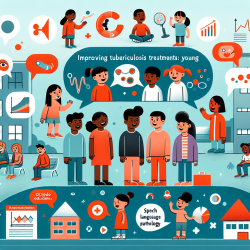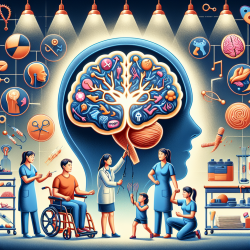Introduction
In the realm of public service, the intersection between health and justice is increasingly recognized as a critical area for intervention and improvement. The research article "Bridging the Gap Between Health and Justice" highlights the urgent need for interdisciplinary collaboration between public health professionals and criminal justice practitioners. This blog post aims to help practitioners enhance their skills by implementing the outcomes of this research and encouraging further exploration of the topic.
The Intersection of Health and Justice
According to the research, more than seven million individuals in the United States are under some form of criminal justice supervision. These individuals often experience higher rates of somatic and mental health issues compared to the general population. Ignoring these health disparities not only affects the individuals but also the communities they return to, perpetuating cycles of injustice and poor health outcomes.
Implementing Research Outcomes
For practitioners, understanding the intersection of health and justice is crucial. Here are some actionable steps to enhance skills and improve outcomes:
- Interdisciplinary Collaboration: Encourage dialogue and partnerships between public health and criminal justice professionals to address shared challenges. This collaboration can lead to more comprehensive care for justice-involved individuals.
- Data-Driven Approaches: Utilize data to identify health disparities and tailor interventions that address the specific needs of the justice-involved population. Evidence-based strategies can significantly improve health outcomes.
- Holistic Assessment: Implement comprehensive health assessments during the intake process in correctional facilities. Identifying and addressing health issues early can prevent the spread of diseases and improve rehabilitation efforts.
Encouraging Further Research
The research underscores the importance of ongoing study in this area. Practitioners are encouraged to delve deeper into the following topics:
- Health Disparities: Investigate the root causes of health disparities among justice-involved individuals and explore innovative solutions to bridge these gaps.
- Reintegration Challenges: Study the barriers to successful reintegration faced by individuals released from incarceration and develop strategies to support their transition back into the community.
- Policy Development: Advocate for policies that promote health equity and justice, ensuring that health care is a fundamental right for all individuals, including those within the criminal justice system.
Conclusion
Bridging the gap between health and justice requires a concerted effort from practitioners across disciplines. By implementing the research outcomes and engaging in further study, we can create a more equitable and just society. For practitioners, this means not only enhancing their skills but also contributing to systemic change that benefits individuals and communities alike.
To read the original research paper, please follow this link: Bridging the gap between health and justice.










